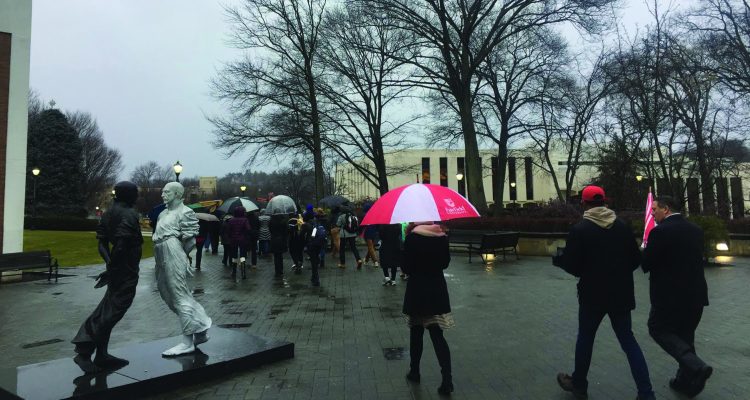Every year, citizens across the country partake in commemorations to celebrate the efforts and legacy of civil rights activist Dr. Martin Luther King Jr. The Fairfield University community is no stranger to living out their Jesuit ideals, coming together and taking virtuous strides against injustices.
On Tuesday Jan. 24, approximately 50 students, faculty and members of the Fairfield public joined together in a Martin Luther King Jr. Memorial March around campus to help raise awareness about the history of social justice and activism at Fairfield.
The march is a traditional staple of the MLK week activities on campus and has happened every Tuesday of the MLK week since it was implemented at Fairfield over six years ago.
There is a committee for the entire MLK week that the march is part of, but the organizers of the march this year were Dr. David McFadden, professor of history, and Dr. Ellen Umansky, professor of religious studies.
Professor McFadden explained that the march was started several years ago to pay homage to different instances in which the Fairfield University community has taken action for civil rights in the past.
Each of the stops on the march represented different strides the community had made.
“Each stop represented a racial incident that has occurred on campus at these areas. Each featured a speaker that was a part of these events to speak on the history of what happened and the significance of the stops on campus,” said Carrie Robinson, assistant director of the Office of Student Diversity and Multicultural Affairs.
The notable movements included the deed of liberating restricted books from a locked cage in the library in 1965, which was celebrated at Canisius Hall during the march. Also, a women’s protest at Egan chapel, as well as a black student protest in 1969 commemorated at Xavier Hall.
Other stops on the march included recognizing the action taken to stand in solidarity with Muslim students in North Carolina at the Stag Statue, a faculty lockout at Bellarmine Hall, and the final stop in which the students and faculty on the march deliberated about the Black Lives Matter movement in the Lower Level of the Barone Campus Center.
The march began at the Egan Chapel of St. Ignatius Loyola and the group marched to the six notable spots around campus, while the leaders and those in the crowd sang songs to the likes of “Blowin in the Wind” by Bob Dylan, the South African hymn “Siyahamba/We are Marching,” popular civil rights folk songs, “Ain’t Gonna Let Nobody Turn me Around,” “O Freedom,” “We shall not be moved,” and ended the march with the powerful tune “Lift Every Voice.”
At each stop there were different speakers that included Professors Mcfadden, Professor Umansky, Professor of History Elizabeth Hohl, Larri Mazon, Director of Institutional Diversity Initiatives, along with Anmol Tabassum ‘18 and Zavon Billups ‘18.
Each speaker gave introductions, spoke about the significance of each stop and started the group off with the different civil rights songs.
“We had a great student turnout for this relatively new, yet important, tradition, echoing the sentiments of Dr. King that injustice anywhere (including at Fairfield University) is a threat to justice everywhere,” said Umansky.
Despite the wintry display of cold weather, many students and esteemed faculty members chose to take part in this special observance.
Senior Joseph Harding was very pleased with the outcome of the event.
“The MLK Memorial March is a great tradition because it represents the Jesuit values our community cherishes,” stated Harding.
“It brings people from all backgrounds and walks of life together in the spirit of unity and compassion. I was happy to see so many people come even though the weather wasn’t all that great today,” he continued.
Interim President of the University Dr. Lynn Babington, who was also in attendance at the memorial march, commented on the importance in maintaining Dr. King’s legacy.
“The MLK memorial march is one of the many events planned this week to celebrate the legacy of Dr. Martin Luther King. Dr. King’s commitment to courage, justice, compassion and dignity for all women and men are critically important for our University community to honor,” said Babington.
This march provided a moment of reflection and unity for students, faculty and the University as a whole.
The purpose of this march and of all other dedicated MLK events are to help the community remember these significant and historic instances of the past
“Part of the Jesuit education is men and women for others.
These moments of activism and sometimes moments of tension have allowed our students to live out their Jesuit ideals and act against,” explained Robinson.
“It is a moment of reflection for the community on where we have been, the progress we have made, and the progress we still need to make,” she continued.


Leave a Reply